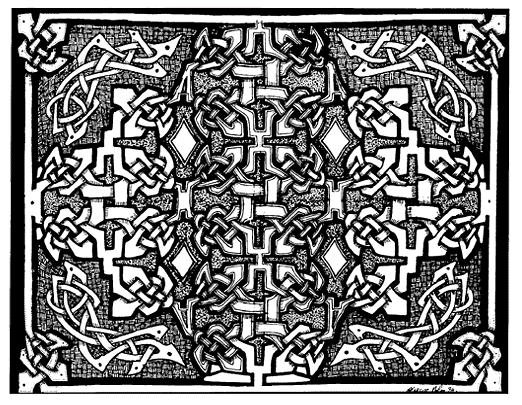

Return to the Garden
Christianity is chiefly responsible for the world's environmental problems. This is because the very spirit of Christianity is both destructive to our planet and ignorant of its needs.
Do you agree with the above statement? Many people do believe this. So it may be a surprise to find that the bible speaks strongly against people abusing the earth. The purpose of this article is to challenge those who see beauty and truth in Christ and the bible, to also realise the bible has a divine environmental plan which is beautiful too.
Specifically, there are three primary biblical points to remember about humanity's relationship to the earth: 1 - people were originally to be caretakers of the earth, under God's guidance and authority; 2 - there are specific guidlines to follow in caring for the earth; 3 - ominously, judgement follows those who misuse the earth.
Genesis 1:28 illustrates the first point on caretaking. "And God blessed them (Adam and Eve); and God said to them "Be fruitful and multiply and fill the earth and subdue it"... The word "subdue" is key here. Some have misread this text, thinking "subdue" can mean exploit or destroy. This is wrong. It actually means to use and care for within a covenant (holy and binding) agreement between people and God.
The main point here to remember is that if someone you love gives you a precious thing to use, you don't thank them by destroying it.
The second point, that people have rules in caring for the earth in covenant, can be seen in Leviticus 25:34. "Six years you shall sow your field and six years you shall prune your vineyard and gather in its crop but during the seventh year the land shall have a sabbath rest, a sabbath to the Lord; you shall not sow your field nor prune your vineyard".
Here clear principles for land use are established. There was to be a rest and fallow period, and not just for the land but also for slaves, hired people, foreign residents, and even farm animals!
Historically, large scale environmental problems began to appear regularly around the time of the Enlightenment. This was the dawning of the scientific age. Two points need to be made. Modern science was based not only on Christian beliefs, but also on ancient Greek assumptions about "Natural Laws" as distinct from God.
Add to this the German philosopher Immanuel Kant's theory that the realm of faith belonged to God, but science was the concern of the people. This brought about the wide split between religion and science which exists today. No longer was agriculture and industry thought to be under God's dominion.
Two problems were caused by this split. The first was science gave people incredible and unheard of powers to exploit nature. The second was nature itself was no longer believed to be under God's standards. The result was ambition and greed increased while the earth was plundered of her fragile resources.
Sometimes this exploitation was committed by pious yet ignorant Christians. Other times it was done by people who didn't know God, but merely claimed to know God. But the abuses were not excused by the bible.
But what does happen when the earth is abused, one might ask? Who will provide justice? There are a few things to remember about those who break God's rules. Paul says "Do not be deceived, God is not mocked; for whatever a man sows, this will he also reap" (Galatians 6:7). Clearly this doesn't concern only morals. More specifically, the Apostle John states emphatically: "...Thy wrath came, and the time for the dead to be judged,...and to destroy those who destroy the earth" (Revelations 11:18).
John is saying that when judgement comes, those who have destroyed the earth will not escape. There will be justice in the end.
In the name of Christ evil has been committed against our earth. But God of the Bible opposes and punishes this destruction. Most important, it is up to those who believe, to make sure the message is spread.
Seán O'Carroll.

In Chaos lies unparalleled opportunity for imposing creative order.
|
Home | Articles | Starsigns | Contacts | Recycling | Links | E-mail |
||||||